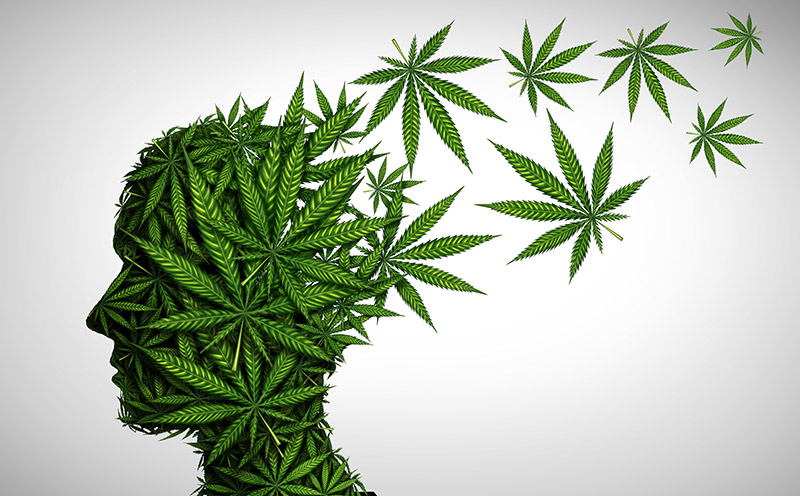Cannabis Detox & Withdrawal
Overcoming cannabis addiction starts with the decision to seek help. An important part of the recovery process is a detox followed by rehabilitation. Undergoing a detox and the symptoms of withdrawal can be scary for most, but with the right support, the process is made easier. To understand a cannabis dependence requires a look at the process of detoxing and what to expect when managing a withdrawal.
What is a Cannabis detox?
A cannabis detox is the process of reducing and quitting the use of cannabis in its various forms (oil, vape, and smoking among others). During a detox the presence of cannabis is significantly reduced in the body until it is no longer present. It is safest to have a detox performed in a professional and supported recovery centre or clinical environment. Here all persons who are struggling to overcome a cannabis dependence will be monitored through the process of detoxification by medical staff. A cannabis detox is not the same as withdrawal. The cannabis withdrawal is characterised by craving the substance and the symptoms of withdrawal.

What is Cannabis Withdrawal?
For cannabis addiction, withdrawal is experienced when individuals stop using. Cannabis withdrawal is experienced during detox. The withdrawal process involves the following symptoms (Medical News Today):
• Irritability
• Depression
• Cravings
• Reduced appetite
• Sleep difficulties
• Nausea
• Stomach pain
• Chills
Cannabis withdrawal syndrome (CWS) has been recently added to the DSM5 (NIH). As cannabis use continues to increase, the DSM 5 explores the prevalence of cannabis addiction among US adults.
Cannabis Withdrawal Symptoms
The severity of cannabis withdrawal symptoms will depend on the frequency of cannabis use and the individual’s physiological state. The intoxication or “high” caused by the ingestion of THC (tetrahydrocannabinol) will depend on individual tolerance. Individuals differ in terms of reaction or levels of intoxication when using cannabis. This will also influence the experience of detox and withdrawal symptoms. Along with the existence of mental health problems, a ‘dual diagnosis’ will make the process of overcoming a detox and the withdrawal symptoms more challenging.
NCBI states that withdrawal symptoms included in a cannabis dependence include:
- Mood and behavioural changes
- Cannabis craving
- Physical symptoms including nausea and stomach pain
- Insomnia
- In rare cases, psychosis may develop.
How Long Does Cannabis Stay in Your System?
Healthline breaks down the period cannabis will remain in your system including its detection in a urine test. Chronic users will show up to 15 days after last use while moderate users will show up to 7 days in a urine test. THC is a fat soluble compound and can remain in the hair follicles up to 90 days (Healthline).

How to Undergo a Cannabis Detox
When undergoing a cannabis detox, it is always best to seek the advice and support of a medical professional. A detox from cannabis can be difficult to achieve on your own particularly if pursued at home. An inpatient programme makes it easier to overcome cannabis addiction owing to the available support. We take a closer look at home detox versus inpatient and outpatient programmes.
Home Cannabis Detox
Many people attempt a home detox because of the comfort and the affordability it offers. To ensure you can manage the process of a detox and the symptoms of a withdrawal, it is always best to consult with a professional medical practitioner specialised in addiction treatment. A doctor will ease the symptoms of withdrawal and supervise those on prescription drugs.
It is necessary to consult with a specialist who can talk you through the process. You can also contact us to help you determine compatible options for detox.
The Pros and Cons of Detoxing from Cannabis at Home
- Comfort and familiarity
- Feeling safe
- Affordable compared to private inpatient services.
- Limited support
- Higher risk of relapse
- The risk of complications where other substances were used
- Worsening of pre-existing psychological conditions (absence of coping with cannabis).
Medically Assisted Cannabis Detox
A medically assisted cannabis detox is completed in a private rehab setting. It is undertaken through an inpatient programme offering improved rates of success for those addicted to cannabis. Private rehabilitation is supervised by a professional medical team with ongoing support should cravings and withdrawal occur.
The Benefits of a Medically Assisted Cannabis Detox
MentalHelp.net encourages those struggling with a cannabis addiction to seek medical advice prior to initiating a detox. While a cannabis detox can be performed at home, it is important to receive professional medical supervision if there is a pre-existing medical condition or complications arise.
If you are dependent on other substances while using cannabis, a medically assisted detox is advised. All persons receive round the clock supervision, support to ease cravings, and faster access to treatment followed by therapy. Depending on the other drugs used, the process of withdrawal can be increasingly difficult and uncomfortable.

How to Cope with Cannabis Withdrawal
If you are battling to overcome a cannabis addiction, finding professional advice and understanding what is entailed in the process of a detox and cannabis withdrawal can help you overcome limitations. The following steps can assist in supporting the process of a cannabis withdrawal.
Take Time Off Work
Because a cannabis detox and withdrawal can impair social functioning and cause physical symptoms, it is advised that one take time off work to focus on overcoming the dependence. For chronic cannabis users, feelings of anxiousness and irritability may disrupt the ability to sustain focus or maintain healthy sleeping patterns. One can consider booking a holiday to focus on overcoming a dependence without disclosing the true reason for taking time off of work.
Remove Cannabis Paraphernalia
All cannabis paraphernalia including pipes, bongs, and other items must be removed from your home environment and frequently visited social settings. These items can increase cravings and the temptation to use. By keeping it out of reach and out of sight, you can focus on your recovery.
Eat Healthy & Exercise
When you take control of your health, you not only look better but you feel better too. Overcoming the fatigue and the mood instabilities created by cannabis use can be improved with a balanced diet and exercise. Healthy foods improve energy and mood while regular exercise builds self confidence and natural motivation.
Talk to Friends & Family
One of the best ways to improve the chances of recovery from a cannabis addiction is to talk to friends and family about your dependence and your goals for quitting. Many families do not understand the process of addiction. By communicating with them, you can educate them and improve your access to immediate support. If you have relatives who smoke cannabis themselves, ask them to keep it to a minimum to prevent the risk of temptation.
Remind Yourself Daily the Reasons You’re Quitting
Stay motivated and focused on your goals by reminding yourself of the reasons you are quitting. If this means creating a list of reasons and checking it daily. Remind yourself of the future you wish to achieve and when things get tough, keep a diary of emotions and reach out to a support group.
Keep Busy
Try not to procrastinate. By keeping busy taking up a new hobby and replacing old habits with constructive practices, you can prevent the triggers and falling into old patterns of addiction. New hobbies can also prevent replacing cannabis dependence with a secondary addiction.
Sleep
According to SSISA, chronic cannabis users can experience disruptions in REM sleep. Sufficient rest is an important part of a healthy recovery because it provides the body time to heal and achieve balance. Research reveals that cannabis reduces the length of rapid eye movement (REM) sleep. This is the part of the sleep cycle that is associated with new memory formation, learning, and recovery.
Preventing a Relapse
A primary goal for those managing an addiction to cannabis is to prevent relapse. For chronic users (those who use cannabis daily), there is a likelihood of developing a tolerance. Tolerance is the process of using a substance in higher doses to achieve the same effect. In this case, to achieve the associated “high.” To prevent the possibility of relapse requires awareness and the following management of a cannabis dependency.
Treating the underlying causes of cannabis dependency
A cannabis dependency is best treated in an inpatient programme where it has become a coping mechanism. By relying on supportive therapy for addiction and other mental health problems, individuals can achieve awareness into the reason for the addiction including the triggers responsible for a cannabis dependency. By seeking effective therapeutic support, individuals learn how to cope, how to overcome trauma, and the best ways to steer clear from the occurrence of a relapse.

Residential rehab
A residential rehab is an inpatient programme. Individuals will enter the rehab and remain at the facility for the duration of treatment. Residential rehab is designed to replicate a home environment that is welcoming and safe for the successful facilitation of therapy. Individuals have limited access to family and friends and will receive a detox, the management of withdrawal symptoms, and access to therapy while in treatment and in aftercare.
A popular approach to treating cannabis dependency is a holistic treatment programme. Such rehabilitation services introduce lifestyle changes along with improved perception and therapy for underlying or pre-existing mental health conditions. Holistic healthcare focuses on mental, physical, and spiritual well-being. It is about teaching important coping skills while encouraging the benefits of a healthy, balance lifestyle for both short and long term results.
Outpatient services & support groups
Outpatient services are also available for those who wish to quit a cannabis dependence. An outpatient programme allows individuals to continue working, maintaining familiar relationships, and a ‘normal lifestyle’ while visiting a therapist to work on the dependency. While you may find that organizations such as the NHS and similar charities provide therapeutic programmes, these services are limited for cannabis addiction. According to Vice, the NHS may not accommodate an inpatient detox from a cannabis dependence. The large number of cannabis users, has also made it hard to accommodate those seeking treatment. Through the process of referral from a professional medical doctor, cannabis users can increase their chances of being accepted into an affordable programme for recovery from cannabis.
One of the best ways to overcome a cannabis addiction is with a support group. Services such as Narcotics Anonymous and marijuana Anonymous are examples of the popular support groups available for treating dependency. Meetings are held weekly in which individuals get to share experiences and struggles with others in a supported environment. It is essential in working towards recovery and led by an experienced therapist. SMART recovery is another programme available for those seeking abstinence from addiction. SMART focuses on self awareness and a non-confrontational or forceful approach to facilitating recovery.
